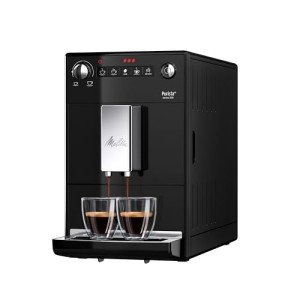5 Clarifications Regarding Energy-Efficient Espresso Machines
Energy-Efficient Espresso Machines: A Comprehensive Guide
In the world of coffee enthusiasts, espresso machines are typically considered necessary appliances for developing abundant, fragrant coffee. Nevertheless, the energy usage connected with these machines can lead to increased utility bills and ecological concerns. As customers end up being more eco-conscious, energy-efficient espresso machines have actually emerged as a popular choice. This post intends to check out the functions, benefits, and alternatives readily available in energy-efficient espresso machines, helping coffee enthusiasts make informed options.
What Makes an Espresso Machine Energy-Efficient?
Energy-efficient espresso machines are developed to decrease energy intake while keeping ideal efficiency. Several features contribute to the energy effectiveness of these machines:
Insulation: High-quality insulation helps retain heat, reducing the energy required to keep ideal brewing temperature levels.
Smart Technology: Many modern machines are geared up with programmable settings that enable users to schedule brewing times and switch to standby mode when not in use.
Quick Heat-up Time: Energy-efficient espresso machines often use advanced heating innovations, such as thermoblocks or PID controllers, to heat water quickly.
Low Wattage: Machines that run at lower wattages take in less energy in general, making them more effective.
Car Shut-off: Automatic shut-off features guarantee that the machine shuts off after a certain period of inactivity, more minimizing energy waste.
Advantages of Energy-Efficient Espresso Machines
Purchasing an energy-efficient espresso machine can provide a number of benefits:
Cost Savings: Over time, lower energy usage can result in minimized electrical energy costs.
Ecological Impact: Using less energy lowers carbon footprints, making these machines a more sustainable choice for environmentally mindful customers.
Improved Performance: Many energy-efficient models likewise use exceptional brewing technologies, resulting in better-tasting espresso.
Sturdiness: Typically, energy-efficient machines are constructed with high-quality parts, causing greater durability.
Features to Consider
When choosing an energy-efficient espresso machine, several features must be taken into consideration:
- Type of Machine: Options include manual, semi-automatic, and fully automatic models, each with differing degrees of user control and automation.
- Brew Quality: Look for machines that make use of high-quality brewing systems to guarantee optimal taste extraction.
- Upkeep: Some machines have self-cleaning features that can conserve energy and effort in maintenance.
- Capability: Depending on personal or household size, machine capability can impact energy usage, with bigger machines typically requiring more power.
Popular Energy-Efficient Espresso Machines
The market offers a range of energy-efficient espresso machines accommodating different requirements and preferences. Below are some notable designs:
Brand
Model
Key Features
Energy Consumption
Breville
Barista Express
Integrated grinder, PID temperature level control, quick heat-up.
Low
DeLonghi
EC155
Compact size, easy to use, resilient construct.
Moderate
Rancilio
Silvia
Sturdy style, exceptional temperature level stability, and has a low ecological impact.
Moderate
Gaggia
Classic
Dependable manual operation, resilient brass parts, and efficient steaming ability.
Low
Jura
E8
Completely automatic, clever functions, and a detachable brew group for simple cleaning.
Low
Tips for Optimal Energy Efficiency
Aside from choosing an energy-efficient design, customers can embrace numerous practices to make the most of energy efficiency:
- Preheat: If your machine has a pre-heating function, use it to guarantee that the ideal temperature level is reached quickly before developing.
- Shut off After Use: Always turn off the machine after brewing or make use of machines with vehicle shut-off features.
- Routine Maintenance: Keep the machine well-maintained to ensure it operates efficiently and efficiently.
FAQs About Energy-Efficient Espresso Machines
1. Are energy-efficient espresso machines more pricey?
While the initial financial investment might be higher for energy-efficient designs, the long-term cost savings on electricity bills can offset the initial cost. In addition, many energy-efficient machines come with advanced functions that improve the brewing experience.
2. How do Steam Espresso Machines know if an espresso machine is energy-efficient?
Look for signs such as Energy Star certification, user reviews, and specs regarding wattage and heat-up time. Machines with particular functions targeted at decreasing energy consumption are usually developed for better efficiency.
3. Can I use an energy-efficient espresso machine for other coffee designs?
Numerous energy-efficient espresso machines offer flexibility, allowing users to brew various coffee designs beyond espresso, such as lattes and cappuccinos, by incorporating steaming capabilities.
4. Do energy-efficient models compromise quality for effectiveness?
Not necessarily. Many energy-efficient espresso machines are equipped with high-quality developing technology that can enhance taste extraction while lowering energy intake.
5. What maintenance is required for energy-efficient espresso machines?
Routine upkeep includes cleaning the machine, descaling when required, and periodically inspecting seals and gaskets to ensure optimum efficiency and energy effectiveness.
Energy-efficient espresso machines represent an ideal blend of performance, savings, and environmental obligation. By considering different features, benefits, and brands, consumers can choose a model that matches their unique preferences while contributing positively to the environment. As the trend towards sustainable living grows, the appeal of energy-efficient devices, consisting of espresso machines, is likely to continue its upward trajectory, using coffee lovers a guilt-free method to enjoy their day-to-day dosage of espresso.
